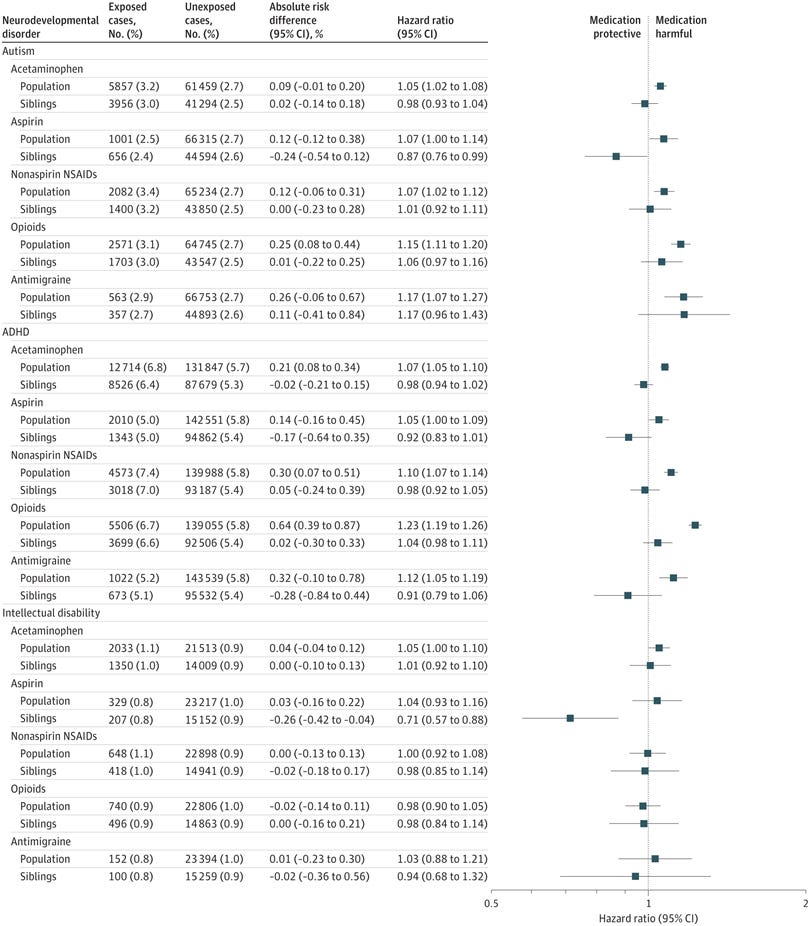There is no autism epidemic, and autism is not caused by paracetamol anyway
Scandinavian register data once again to the rescue
In the latest genius move, the Trump administration has claimed that the commonly used painkiller paracetamol (Tylenol, Panadol, acetaminophen, various other names) causes autism. As we have seen however, there is no autism epidemic, only an epidemic in changing diagnostic criteria. Painkillers don’t cause autism. The way to look at this is compare siblings with the same parents, where the mother took paracetamol in one pregnancy and not the other. There are several such studies for a variety of outcomes, but maybe the best is the Swedish register study (Ahlqvist et al 2024):
Results In total, 185 909 children (7.49%) were exposed to acetaminophen during pregnancy. Crude absolute risks at 10 years of age for those not exposed vs those exposed to acetaminophen were 1.33% vs 1.53% for autism, 2.46% vs 2.87% for ADHD, and 0.70% vs 0.82% for intellectual disability. In models without sibling control, ever-use vs no use of acetaminophen during pregnancy was associated with marginally increased risk of autism (hazard ratio [HR], 1.05 [95% CI, 1.02-1.08]; risk difference [RD] at 10 years of age, 0.09% [95% CI, −0.01% to 0.20%]), ADHD (HR, 1.07 [95% CI, 1.05-1.10]; RD, 0.21% [95% CI, 0.08%-0.34%]), and intellectual disability (HR, 1.05 [95% CI, 1.00-1.10]; RD, 0.04% [95% CI, −0.04% to 0.12%]). To address unobserved confounding, matched full sibling pairs were also analyzed. Sibling control analyses found no evidence that acetaminophen use during pregnancy was associated with autism (HR, 0.98 [95% CI, 0.93-1.04]; RD, 0.02% [95% CI, −0.14% to 0.18%]), ADHD (HR, 0.98 [95% CI, 0.94-1.02]; RD, −0.02% [95% CI, −0.21% to 0.15%]), or intellectual disability (HR, 1.01 [95% CI, 0.92-1.10]; RD, 0% [95% CI, −0.10% to 0.13%]). Similarly, there was no evidence of a dose-response pattern in sibling control analyses. For example, for autism, compared with no use of acetaminophen, persons with low (<25th percentile), medium (25th-75th percentile), and high (>75th percentile) mean daily acetaminophen use had HRs of 0.85, 0.96, and 0.88, respectively.
Conclusions and Relevance Acetaminophen use during pregnancy was not associated with children’s risk of autism, ADHD, or intellectual disability in sibling control analysis. This suggests that associations observed in other models may have been attributable to familial confounding.
Essentially nothing was found when comparing siblings (if you squint, you can find a few sibling results with p = .04, such as aspirin having a protective effect against autism!). This is not so surprising because everything is genetically confounded in the regular studies. The null results also fit with most other studies of just about everything else pregnant women are scared of. You can relax and have fun! Drink wine while breastfeeding (or use milk replacement instead), you can even smoke while pregnant, and do most other things except get drunk or go mountain climbing.
The upside of this paracetamol scare is that unlike vaccines, we have plenty of alternative painkillers at hand. Thus, whatever behavior this Trump admin. pronouncement will cause, the effects will probably be relatively harmless. This turns this entire thing into a triple nothingburger: there is no autism epidemic, the nonexistent problem can’t be fixed by not taking paracetamol, and the costs of avoiding paracetamol will also be just about nothing since there are plenty of alternatives. It does, however, make the RFK anti-big pharma camp look supremely stupid. One might almost suspect Trump of playing 5d chess here in some Mao-like move to discredit part of his own administration.



No way anyone can say the increase in autism is solely due to looser diagnostic criteria. It certainly is a factor but I don't think any honest informed person would claim its solely that - indeed it seems very, very unlikely. The evidence presented by Kennedy and the CDC does overall suggest a possible link to Tylenol emerging from the majority of studies. The study you cite did not after using controls. The controls did make it somewhat stronger on its own compared to the other correlational studies, but it is only one study and controls can sometimes produce misleading results. The obvious conclusion from the research we have so far is that the evidence overall does suggest a possible link and that caution in using Tylenol during pregnancy is eminently sensible -- and this is exactly what the CDC report concluded. Your report on this is seriously misleading and irresponsible.
You don't get the point, Emil. The goal is to avoid people having to admit that it's something in their genetic makeup that caused their kid to not be the perfect child they wanted. Please note the unwillingness to look at the most probable environmental factor for "autism"; having your children when older.